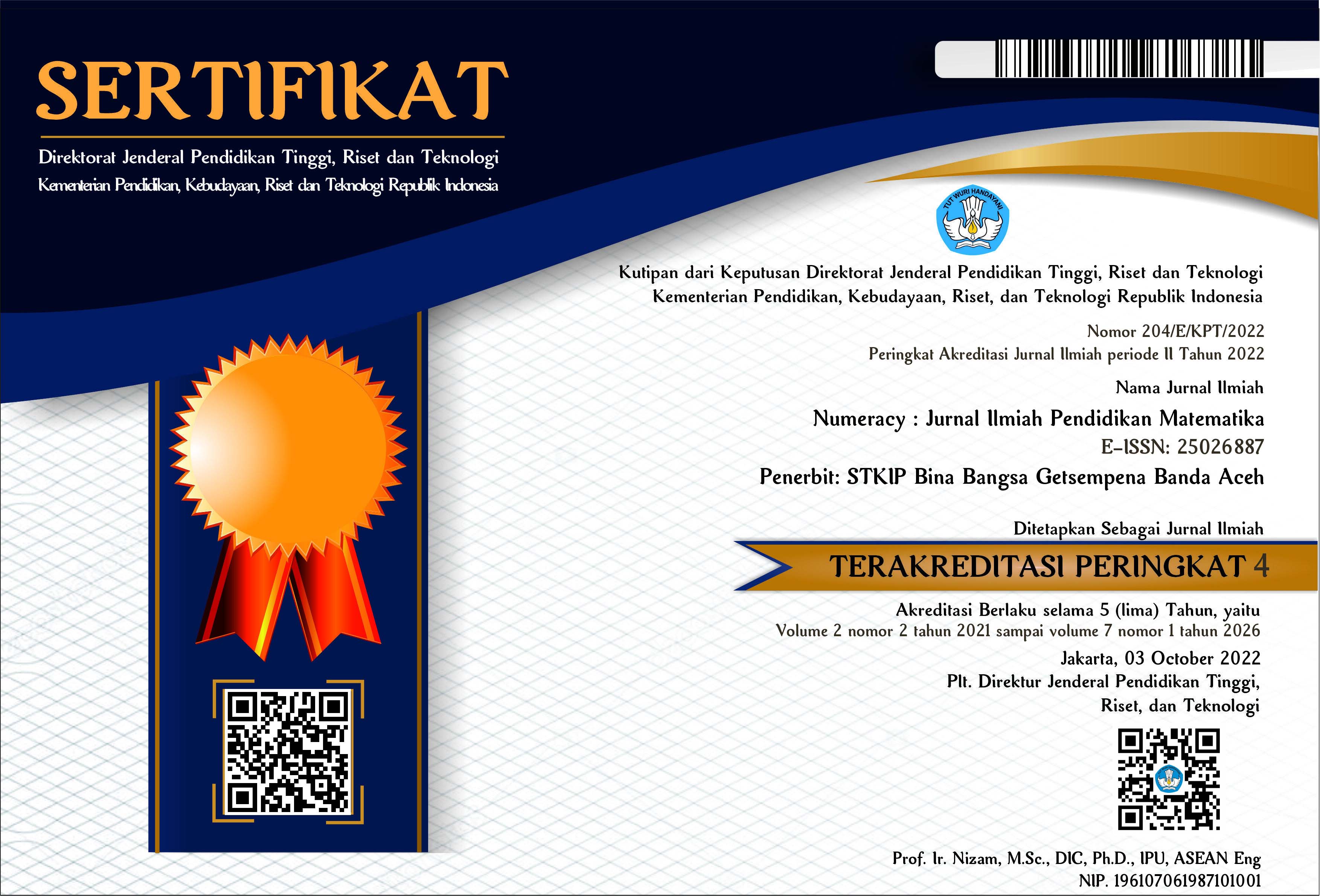PENINGKATAN KEMAMPUAN KOMUNIKASI MATEMATIS SISWA SMP MELALUI STRATEGI PEMBELAJARAN KONFLIK KOGNITIF
Abstract
The research is a quasi-experimental research and used nonrandomized control group, pretest-posttest design, aiming to analyze the differences of the improvement of mathematical communication abilities between the students receiving scientific learning using cognitive conflict strategy (PSSKK) and the students receiving scientific learning (PS). It was observed in general and based on each mathematical prior student’s ability (MPA) in high, medium, and low level. The subject of the research is the 8th grade students in Junior High School 1 Lembang, West Bandung, which two classes are selected as a sample from available ten classes. The results showed that: (1) Generally, the students’s improvement of mathematical communication abilities in PSSKK is better than students in PS; and (2) based on MPA obtained that: (a) the students’s improvement of mathematical communication with high MPA in PSSKK and in PS is not significantly different; (b) the students’s improvement of mathematical communication with medium and low MPA in PSSKK is better than in PS.
Abstrak
Penelitian ini merupakan penelitian kuasi eksperimen dengan desain pretes-postes kelompok kontrol tidak acak (nonrandomized control group, pretest-posttest design) yang bertujuan untuk menelaah perbedaan peningkatan kemampuan komunikasi matematis antara siswa yang memperoleh pembelajaran saintifik strategi konflik kognitif (PSSKK) dengan siswa yang memperoleh pembelajaran saintifik (PS) baik secara keseluruhan maupun ditinjau dari masing-masing kemampuan awal matematis (KAM) siswa (tinggi, sedang, dan rendah). Populasi dari penelitian ini adalah seluruh siswa kelas VIII SMP Negeri 1 Lembang Kabupaten Bandung Barat, dengan sampel dipilih dua kelas dari sepuluh kelas yang tersedia. Hasil penelitian menunjukkan bahwa: (1) secara keseluruhan, peningkatan kemampuan komunikasi matematis siswa kelas PSSKK lebih baik daripada siswa kelas PS; dan (2) berdasarkan KAM diperoleh: (a) peningkatan kemampuan komunikasi matematis siswa kelompok KAM tinggi kelas PSSKK dengan kelas PS tidak berbeda secara signifikan; (b) peningkatan kemampuan komunikasi matematis siswa kelompok KAM sedang dan rendah kelas PSSKK lebih baik daripada siswa kelas PS.
Kata kunci: Strategi konflik kognitif, pembelajaran saintifik, kemampuan komunikasi matematis, kemampuan awal matematis
References
Baddock, M. & Bucat, R. (2008). Effectiveness of a classroom chemistry demonstration using the cognitive conflict strategy. International Journal of Science Education, 30(8).
Creswell, J.W. (2012). Educational Research: Planning, Conducting, and Evaluating Quantitative And Qualitative Research. New Jersey: Pearson Education.
Dahlan, J.A., Rohayati, A., & Karso. (2012). Implementasi Strategi Pembelajaran Konflik Kognitif Dalam Upaya Meningkatkan High Order Mathematical Thinking Siswa. Jurnal Pendidikan, 13 (2).
Ismaimuza, D. (2013). Kemampuan Berpikir Kritis dan Kreatif Matematis Siswa SMP Melalui Pembelajaran Berbasis Masalah dengan Strategi Konflik Kognitif. Jurnal Teknologi, 63(2).
Isrok’atun, dkk (2014). Situation-Based Learning To Improve Students’ Mathematical Creative Problem Solving Ability. Far East Journal of Mathematical Education, 12(2).
Kang, H., et. al. (2010). Cognitive Conflict and Situational Interest As Factors Influencing Conceptual Change. International Journal of Environment & Science Education, 5 (4).
Permendiknas. (2013). Lampiran Peraturan Menteri Pendidikan Nasional Republik Indonesia Nomor 69 Tahun 2013 tentang Standar Isi. Jakarta: BSNP.
Putra, R.W.Y. (2014). Penerapan Pembelajaran Konflik Kognitif Untuk Meningkatkan Kemampuan Pemecahan Masalah dan Komunikasi Matematis Siswa SMA. (Tesis). Sekolah Pascasarjana, Universitas Pendidikan Indonesia. Bandung.
Stylianides, A., & Stylianides, G.J. (2008). Cognitive Conflict As A Mechanism For Supporting Developmental Progressions In Student’s Knowledge About Proof. Article for TSG-18, ICME-11 (2008).
Sugiyono. (2008). Metode Penelitian Pendidikan dengan Pendekatan Kuantitatif, Kualitatif, dan R&D. Bandung: Alfabeta.
Wardhani, S. & Rumiati (2011). Instrumen Penilaian Hasil Belajar Matematika SMP: Belajar Dari Pisa dan Timss. Yogyakarta: Kementrian Pendidikan Nasional.
Yunus, M (2008). Perbandingan strategi konflik kognitif dengan strategi konvensional terhadap hasil belajar siswa kelas XI IPA SMA Negeri 1 Makassar (studi pada materi pokok stoikiometri larutan). Jurnal Chemica, 9(2).
Zulkarnaen, I. (2013). Kemampuan Pemahaman dan Komunikasi Matematis Siswa Dalam Pembelajaran Kooperatif Berbasis Konflik Kognitif. (Tesis). Sekolah Pascasarjana, Universitas Pendidikan Indonesia. Bandung.



















